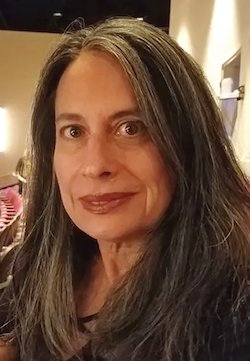Rabbi Suzanne Singer of Temple Beth El in Riverside, Calif., ended the 2022-23 Hineini lecture series in April on a distinctly positive note. Her Zoom talk, hosted by the Victoria congregation Kolot Mayim, focused on “finding hope in a world of unending problems.”

Singer began with the story of the golden calf. When Moses is delayed on Mount Sinai, the people, fearing he won’t return, make an idol to worship – a terrible sin. However, said Singer, God was prepared for this transgression and offered a means to repentance: instructions for the tabernacle.
“The Mishkan was built as a place for God to dwell and to bring God’s presence back among the people,” she said. “By offering the Israelites the opportunity to use their gold for a higher purpose, God is giving them the opportunity to redeem themselves and to resume their intimate relationship to God.”
Yet, she pointed out, the instructions for the tabernacle were given before the calf appears. Among the possible explanations for the inverted order is the notion of hope.
“It’s almost a 100% certainty that, at some point, every human being is going to commit a transgression,” said Singer. “But God is prescient enough to understand this, so, underlying God’s instructions for the Mishkan is the reality of sin. God knows that people are going to sin, but God wants to guarantee that there’s always a possibility of redemption, that there’s always a tabernacle available for every golden calf.”
According to Singer, this knowledge can allow us to live our lives understanding we have the ability to make amends. With all the problems in the world – climate change, wars, economic disruption, gun violence – people need to remember that the tools are there to repair the world (and the soul).
“God is telling us that we can transform our idolatry, our egoism, our greed, our thirst for power into something sacred,” said Singer.
Singer defines hope as a commitment that allows us to picture the future and provides us the energy to build it. Hope requires action and a stubborn determination to produce a positive outcome.
She cited several examples in which hope persevered against extraordinary odds, from the pear tree outside the World Trade Centre that survived the Sept. 11, 2001, terror attacks to the Ethiopian Jews who trekked through dangerous terrain to reach the airlifts to Israel.
“Resilience is linked to the belief that we can make a difference in our lives and the lives of others. Hope really gives us the will to not only heal ourselves, but to make the world a better place,” she said.
The rabbis of our tradition, said Singer, tell us that, when we arrive in heaven, we will be asked seven questions: the most important one is, did you live with hope?
Using the words of Rabbi Jonathan Sacks, Singer noted that Judaism is the only civilization whose golden age is in the future. “If we don’t like what we see in our society or in our world, we have the capacity to make things better,” Singer said. “The Exodus story tells us that our circumstances do not define us, and that we can change those circumstances for a better future.”
Quoting Sacks again, she added, “To be a Jew is to be an agent of hope. In a world serially threatened by despair, every ritual, every mitzvah, every syllable of the Jewish story is a protest against escapism, resignation or the blind acceptance of fate.”
Even in the polarized political climate of our age there is hope, Singer said, offering Derek Black as an example. A decade ago, Black was a rising figure in the white supremacist movement. After engaging with and getting to know an ethnically diverse group of students during Shabbat dinners at a Florida university, he renounced his racist worldview.
Acknowledging that many serious problems exist, Singer noted that war is rarer now, genocides are fewer, life expectancy is higher and hunger has diminished.
“No one knows the wars that don’t happen, the family members who aren’t claimed by disease, the children who don’t die in infancy,” she said.
“Hope is a strategy, not a feeling, and it’s within our power to call it forth,” she concluded. “One needs to believe in and build a future, even if we may not be there to experience it.”
Singer, who was a student rabbi at Kolot Mayim in the early 2000s, is active on many fronts. She serves as a member of the Reform movement’s Commission on Social Action and as president of Pacific Area Reform Rabbis.
Sam Margolis has written for the Globe and Mail, the National Post, UPI and MSNBC.
